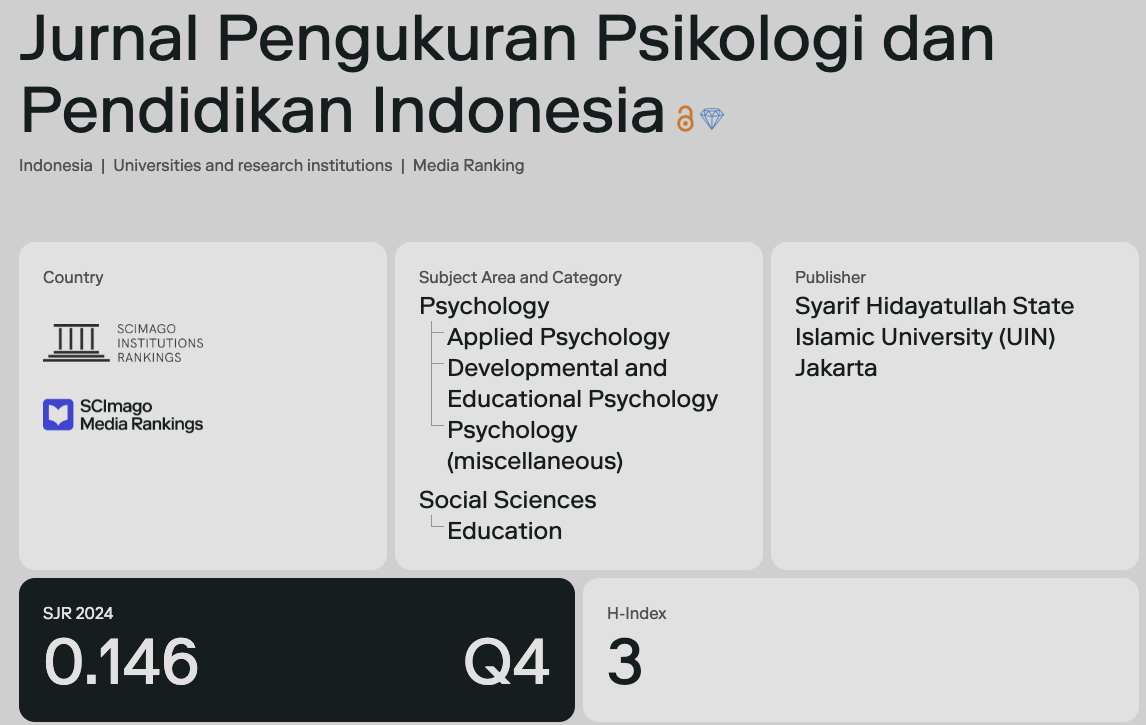Rasch Analysis of The Indonesian Version of Individual Work Performance Questionnaire (IWPQ)
DOI:
https://doi.org/10.15408/jp3i.v11i2.24157Keywords:
individual work performance, individual work performance questionnaire, rasch analysis, work performanceAbstract
The Individual Work Performance Questionnaire was developed by Koopmans et al. (2013). This questionnaire was based on the construct of individual work performance which consists of task performance, contextual performance, and counterproductive work behavior. Widyastuti & Hidayat (2018) adapted the IWPQ into Bahasa Indonesia. The mentioned research used the classical test theory (CTT) approach to validate the instrument. Therefore, the findings were only applicable to the study’s sample, as validity and reliability could not be legitimately generalized to other study settings. In comparison, the development of the original IWPQ used Rasch analysis to examine its measurement properties. Rasch analysis is a modern psychometric approach based on item response theory (IRT), which has several advantages over the CTT. This study aimed to validate the psychometric properties of the Indonesian Version of IWPQ using the Rasch model. The psychometric properties discussed in this study include instrument reliability, person and item reliability, unidimensionality, rating scale functioning, and bias detection (Differential Item Functioning). The 213 participants in this research survey were Indonesian citizens aged 18-46 years old (mean = 30.64, SD = 8.55) and were actively working for at least three months at their current job. The result showed that the assumption of the unidimensionality of each sub-scale of IWPQ was fulfilled. The 5-Likert rating scales of this instrument had adequate functionality. The person reliability for all sub-scales ranged from .58 - .80. Meanwhile, the item reliability ranged from .90 - .97. The separations were considered high with a value ranging from 3.04 – 5.77. All items in this instrument functioned well to measure individual work performance except for one item in sub-scale Contextual Performance. This specific item should be revised to achieve a more accurate measurement of the construct. There was one item that was considered biased toward gender in sub-scale Contextual Performance. Also, there was one item that was considered biased toward tenure in sub-scale Counterproductive Work Behavior. These findings had implications for using the Indonesian Version of IWPQ to assess employees’ individual work performance and recommendations for future research.
References
Alagumalai, S., & Curtis, D. D. (2005). Classical test theory bt - applied rasch measurement: A book of exemplars: papers in honour of john p. keeves (R. Maclean, R. Watanabe, R. Baker, Boediono, Y. C. Cheng, W. Duncan, J. Keeves, Z. Mansheng, C. Power, J. S. Rajput, K. H. Thaman, S. Alagumalai, D. D. Curtis, & N. Hungi (eds.); pp. 1–14). Springer Netherlands. https://doi.org/10.1007/1-4020-3076-2_1
Bohlmann, C., & Zacher, H. (2021). Making things happen (un)expectedly: Interactive effects of age, gender, and motives on evaluations of proactive behavior. Journal of Business and Psychology, 36(4), 609–631. https://doi.org/10.1007/s10869-020-09691-7
Bond, T., & Fox, C. M. (2015). Applying the asch model: fundamental measurement in the human sciences (third edition). Routledge. https://doi.org/https://doi.org/10.4324/9781315814698
Campbell, J. P., & Wiernik, B. M. (2015). The modeling and assessment of work performance. Annual Review of Organizational Psychology and Organizational Behavior, 2(1), 47–74. https://doi.org/10.1146/annurev-orgpsych-032414-111427
Ceschi, A., Fraccaroli, F., Costantini, A., & Sartori, R. (2017). Turning bad into good: How resilience resources protect organizations from demanding work environments. Journal of Workplace Behavioral Health, 32(4), 267–289. https://doi.org/10.1080/15555240.2017.1398659
Dåderman, A. M., Ingelgård, A., & Koopmans, L. (2020). Cross-cultural adaptation, from dutch to swedish language, of the individual work performance questionnaire. Work (Reading, Mass.), 65(1), 97–109. https://doi.org/10.3233/WOR-193062
Daraba, D., Wirawan, H., Salam, R., & Faisal, M. (2021). Working from home during the corona pandemic: Investigating the role of authentic leadership, psychological capital, and gender on employee performance. Cogent Business & Management, 8(1), 1885573. https://doi.org/10.1080/23311975.2021.1885573
Dobrow, S., & Ganzach, Y. (2014). Job satisfaction over time: A longitudinal study of the differential roles of age and tenure. Academy of Management Proceedings, 2014, 13905. https://doi.org/10.5465/AMBPP.2014.13905abstract
Fisher, W. P. (2007). Rating scale instrument quality criteria. Rasch Measurement Transactions, 21(1), 1095.
Grasiaswaty, N. (2020). The role of work stress on individual work performance: Study in civil servants. Jurnal Manajemen Dan Pemasaran Jasa; Vol 13, No 1 (2020): Maret. https://doi.org/10.25105/jmpj.v13i1.5051
Holster, T. A., & Lake, J. (2016). Guessing and the rasch model. Language Assessment Quarterly, 13(2), 124–141. https://doi.org/10.1080/15434303.2016.1160096
Koopmans, L., Bernaards, C., Hildebrandt, V., van Buuren, S., van der Beek, A. J., & de Vet, H. C. W. (2013). Development of an individual work performance questionnaire. International Journal of Productivity and Performance Management, 62(1), 6–28. https://doi.org/10.1108/17410401311285273
Koopmans, L., Bernaards, C. M., Hildebrandt, V. H., Schaufeli, W. B., de Vet Henrica, C. W., & van der Beek, A. J. (2011). Conceptual frameworks of individual work performance: a systematic review. Journal of Occupational and Environmental Medicine, 53(8). https://journals.lww.com/joem/Fulltext/2011/08000/Conceptual_Frameworks_of_Individual_Work.6.aspx
Linacre, J. (2007). RUMM2020 item-trait chi-square and winsteps dif size. Retrieved from https://www.rasch.org/rmt/rmt211k.htm
Linacre, J. (2012). A user’s guide to winstep® ministep rasch-model computer programs. Retrieved from
Metin, U. B., Peeters, M. C. W., & Taris, T. W. (2018). Correlates of procrastination and performance at work: The role of having “good fit.” Journal of Prevention & Intervention in the Community, 46(3), 228–244. https://doi.org/10.1080/10852352.2018.1470187
Ng, T. W. H., & Feldman, D. C. (2010). Organizational tenure and job performance. Journal of Management, 36(5), 1220–1250. https://doi.org/10.1177/0149206309359809
Prasetyo, I., Endarti, E. W., Endarto, B., Aliyyah, N., Rusdiyanto, Tjaraka, H., Kalbuana, N., & Rochman, A. S. (2021). Effect of compensation and discipline on employee performance: A Case study indonesia. Journal of Hunan University Natural Sciences.
Ramdani, Z., Tae, L. F., Prakoso, B. H., & Luanganggoon, N. (2021). Personality trait, self-efficacy, and individual work performance on science teachers in indonesia bt - Proceedings of the International Conference on Educational Assessment and Policy (ICEAP 2020). 16–21. https://doi.org/https://doi.org/10.2991/assehr.k.210423.058
Ramos-Villagrasa, P. J., Barrada, J. R., Fernández-Del-Río, E., & Koopmans, L. (2019). Assessing job performance using brief self-report scales: The case of the individual work performance questionnaire. Revista de Psicologia Del Trabajo y de Las Organizaciones. https://doi.org/10.5093/jwop2019a21
Rostiana, R., & Lie, D. (2019). Multi-dimensional individual work performance: Predictors and mediators. GATR Global Journal of Business Social Sciences Review. https://doi.org/10.35609/gjbssr.2019.7.1(7)
Srihadi, P., Saragih, F., & Nugroho, B. (2019). Effect of organizational culture on individual work performance and organizational performance (Study at pt. kramayudha tiga berlian motors). https://doi.org/10.4108/eai.30-7-2019.2287584
Sumintono, B., & Widhiarso, W. (2014). Aplikasi model rasch untuk penelitian ilmu-ilmu sosial. Trim Komunikata.
van der Lippe, T., & Lippényi, Z. (2020). Co-workers working from home and individual and team performance. New Technology, Work and Employment, 35(1), 60–79. https://doi.org/https://doi.org/10.1111/ntwe.12153
van der Vaart, L. (2021). The performance measurement conundrum: Construct validity of the Individual Work Performance Questionnaire in South Africa . In South African Journal of Economic and Management Sciences (Vol. 24, pp. 1–11). scieloza .
Varshney, D., & Varshney, N. K. (2020). Workforce agility and its links to emotional intelligence and workforce performance: A study of small entrepreneurial firms in India. Global Business and Organizational Excellence, 39(5), 35–45. https://doi.org/https://doi.org/10.1002/joe.22012
Widyastuti, T., & Hidayat, R. (2018). Adaptation of individual work performance questionnaire (IWPQ) into bahasa Indonesia. International Journal of Research Studies in Psychology. https://doi.org/10.5861/ijrsp.2018.3020
Yu, C. H. (2020). Objective measurement: How rasch modeling can simplify and enhance your assessment. In Rasch Measurement: Applications in Quantitative Educational Research. https://doi.org/10.1007/978-981-15-1800-3_4








